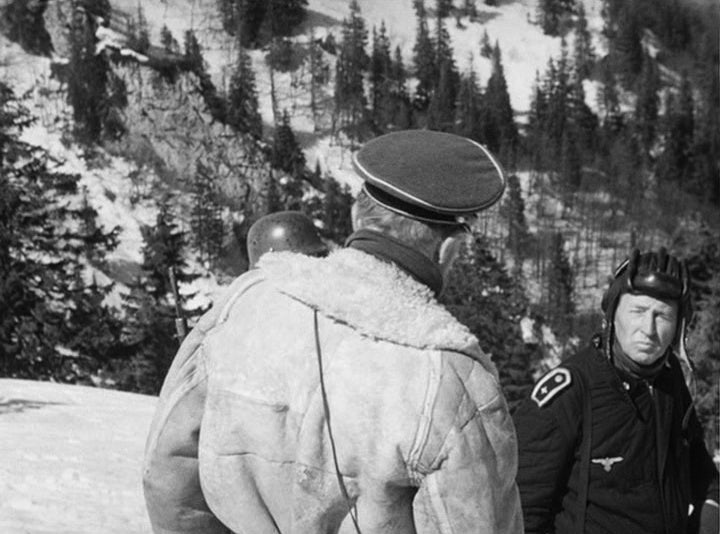In 1965, director Stanislav Barabáš brought to the screen a harrowing yet deeply humanistic war drama, The Bells Toll for the Barefooted (Zvony pre bosých). Set against the backdrop of the waning days of World War II, this film stands as a poignant reminder of the absurdity and cruelty of war while also offering a profound message of compassion and the sanctity of human life, even amid conflict. 
The film unfolds in the high, snow-covered Slovak mountains, where partisan fighters Ondrej (Vlado Müller) and Stašek (Ivan Rajniak) find themselves at odds with retreating Nazi forces. In one skirmish, they capture a young German soldier, Hans (Axel Dietrich), after killing two of his comrades. Their plan is to deliver Hans to their command for interrogation, but upon arriving, they discover that the headquarters has been burned down, leaving them stranded with Hans in the treacherous wilderness.

Caught in a perilous journey through the unforgiving mountain terrain, Ondrej, Stašek, and Hans find themselves bound together in an uneasy alliance. Hans is aware that attempting to escape could be fatal, given his unfamiliarity with the terrain and the brutal weather conditions. Thus, he is compelled to trust his captors, leading to a tense and complex interplay between the three men. Along the way, they encounter a stray barmaid, further complicating their dynamic.

All the while, they are pursued by a ruthless German tank unit led by Lieutenant (Radovan Lukavský), and in the eerie silence of the mountains, they hear the faint toll of church bells, forewarning death and echoing ever louder.

Stanislav Barabáš, working from a screenplay by Ivan Bukovčan based on his own book, masterfully explores the absurdity of war. The film exposes how conflict inflicts pain on all, regardless of their nationality or allegiance. Yet, amid the chaos and brutality, it highlights the human capacity for empathy and underscores the value of life, even that of a perceived enemy. 
The film's themes are amplified by the superb performances of the cast. Ivan Rajniak is particularly memorable as Stašek, embodying the moral ambiguity of a partisan forced to decide the fate of a young German soldier. Vlado Müller and Axel Dietrich also deliver compelling portrayals, bringing depth and nuance to their characters. Radovan Lukavský, as the ruthless German lieutenant, adds a chilling presence to the pursuit, heightening the tension throughout the film.

Another standout is the film's musical score, composed by Zdeněk Liška. His almost symphonic accompaniment adds a layer of dramatic intensity, blending irony and absurdity into the narrative. Liška's music, combined with Vincent Rosinec's atmospheric cinematography, creates a chilling yet captivating ambiance, emphasizing the film's existential tone.  Despite its powerful storytelling and critical acclaim, The Bells Toll for the Barefooted was pulled from distribution after 1969, during the oppressive era following the Prague Spring. It was not until after the fall of communism in 1989 that the film resurfaced, allowing a new generation to experience its poignant message.
Despite its powerful storytelling and critical acclaim, The Bells Toll for the Barefooted was pulled from distribution after 1969, during the oppressive era following the Prague Spring. It was not until after the fall of communism in 1989 that the film resurfaced, allowing a new generation to experience its poignant message.

This Slovak gem from the 1960s, with its beautifully crafted dialogues, existential atmosphere, and biting ironic humor, remains a testament to the strength of Slovak cinema. Its dramatic tension, built up around the fate of the young German soldier, culminates in a memorable final confrontation, reminiscent of the moral dilemmas explored in Kachyňa's Coach to Vienna.  The Bells Toll for the Barefooted is more than just a war drama; it's a searing exploration of humanity in times of conflict. Through its stark storytelling and compelling characters, it leaves a lasting impression on the viewer, a reminder of the absurdity of war and the glimmer of hope found in compassion.
The Bells Toll for the Barefooted is more than just a war drama; it's a searing exploration of humanity in times of conflict. Through its stark storytelling and compelling characters, it leaves a lasting impression on the viewer, a reminder of the absurdity of war and the glimmer of hope found in compassion.











